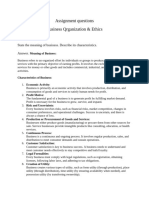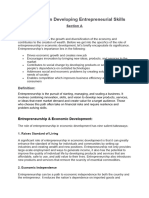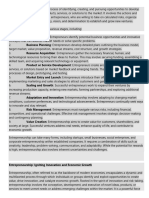Business
Business
Uploaded by
analie mendezCopyright:
Available Formats
Business
Business
Uploaded by
analie mendezCopyright
Available Formats
Share this document
Did you find this document useful?
Is this content inappropriate?
Copyright:
Available Formats
Business
Business
Uploaded by
analie mendezCopyright:
Available Formats
The Essence of Business: A Comprehensive Exploration
Introduction
Business, in its simplest form, is the practice of making one's living by producing or buying and selling
goods or services. It's a crucial pillar of modern society, influencing economies, cultures, and individual
lives. This essay delves into the multifaceted nature of business, exploring its fundamental components,
importance, and evolving dynamics.
The Foundation of Business
At the core of any business are four primary elements: product, market, finance, and management.
1. Product or Service: The cornerstone of a business is the product or service it offers. This could
range from tangible goods like electronics and clothing to intangible services such as consulting
and digital solutions. The value proposition of the product or service determines the business's
market positioning and competitive advantage.
2. Market: Understanding the target market is crucial. This involves identifying potential customers,
understanding their needs and preferences, and strategizing how to reach them effectively.
Market research and segmentation play pivotal roles in this aspect.
3. Finance: Financial management is the backbone of business operations. It encompasses
budgeting, accounting, investment, and funding. Sound financial practices ensure that the
business can sustain operations, grow, and achieve profitability.
4. Management: Efficient management is essential for coordinating activities, making strategic
decisions, and steering the business towards its goals. This includes leadership, human
resources, and operational management.
The Importance of Business
Businesses are vital for several reasons:
1. Economic Growth: Businesses drive economic development by creating jobs, generating income,
and contributing to GDP. They foster innovation and technological advancements, which spur
further growth and development.
2. Social Impact: Businesses influence societal norms and lifestyles. They provide essential goods
and services that improve the quality of life. Moreover, businesses engage in corporate social
responsibility (CSR) initiatives that address social issues and contribute to community welfare.
3. Personal Fulfillment: For entrepreneurs and employees alike, business can be a source of
personal satisfaction. It offers opportunities for creativity, problem-solving, and professional
growth. Successful businesses can also lead to financial independence and stability.
The Evolving Business Landscape
The landscape of business is continually evolving, driven by various factors:
1. Technological Advancements: Technology is revolutionizing how businesses operate.
Automation, artificial intelligence, and digital platforms are enhancing efficiency, customer
engagement, and data-driven decision-making.
2. Globalization: The interconnectedness of the global economy presents both opportunities and
challenges. Businesses can access international markets, diversify their portfolios, and benefit
from global supply chains. However, they must also navigate complex regulations, cultural
differences, and geopolitical risks.
3. Sustainability: There is a growing emphasis on sustainable business practices. Companies are
increasingly adopting eco-friendly measures, reducing carbon footprints, and promoting ethical
sourcing. Sustainability is becoming a key factor in consumer preferences and corporate
reputation.
4. Innovation and Entrepreneurship: The rise of startups and innovative ventures is reshaping
industries. Entrepreneurs are leveraging disruptive technologies and novel business models to
challenge established players and create new markets.
Conclusion
Business is a dynamic and integral part of human civilization. Its impact extends beyond economic
parameters, influencing social structures, technological progress, and individual aspirations. As the world
continues to evolve, businesses must adapt and innovate to thrive in an ever-changing environment. By
understanding the foundational elements, recognizing its importance, and navigating the evolving
landscape, businesses can not only achieve success but also contribute to the broader societal good.
You might also like
- Document04 (Ibis Style)Document3 pagesDocument04 (Ibis Style)SMK BHARA TRIKORA 1 JAKARTANo ratings yet
- LenskartDocument14 pagesLenskartHussainRihab88% (8)
- Hunter & Bard's Account-Based Marketing Playbook: For Enterprise MarketersDocument20 pagesHunter & Bard's Account-Based Marketing Playbook: For Enterprise MarketersPatricia Ezell100% (2)
- Chipotle ProjectDocument19 pagesChipotle ProjectX1u100% (1)
- Challenges in BusinessDocument2 pagesChallenges in BusinessCassidyNo ratings yet
- DMBS, 24Document47 pagesDMBS, 24divyajwalamediavisionNo ratings yet
- SM Unit-1Document11 pagesSM Unit-1shiva12mayNo ratings yet
- Business OrganizaionDocument11 pagesBusiness Organizaionbhavyaanand061No ratings yet
- UNIT 1 EntrepreneurshipDocument18 pagesUNIT 1 EntrepreneurshipAdersh PandeyNo ratings yet
- BMB106 - Unit 2 - CIEDocument25 pagesBMB106 - Unit 2 - CIEmayaverma123pNo ratings yet
- EntrepreneurshipDocument23 pagesEntrepreneurshipMahroosh Khan004No ratings yet
- Agr 319 Ass 3Document6 pagesAgr 319 Ass 3faithdin8788No ratings yet
- Ent Cl@ss NoteDocument5 pagesEnt Cl@ss Notengozig82No ratings yet
- Unit-I-Entrepreneurial Skills and OpportunitiesDocument19 pagesUnit-I-Entrepreneurial Skills and OpportunitiesMvs santoshNo ratings yet
- Hel EntrDocument21 pagesHel Entralemfikadu272No ratings yet
- Unit II Entrepreneural Environment and PoliciesentrepreneurshipDocument6 pagesUnit II Entrepreneural Environment and PoliciesentrepreneurshipMARIDAYYA NAIDU BODAPATHRUNINo ratings yet
- Lesson 2-PrelimsDocument6 pagesLesson 2-PrelimsJoy PolicarpioNo ratings yet
- Entrepreneurship DevelopmentDocument30 pagesEntrepreneurship Developmentanirbandey1122No ratings yet
- Tugas Kelompok Week 2 Ekonomi UMKM PDFDocument5 pagesTugas Kelompok Week 2 Ekonomi UMKM PDFHisyam 2002No ratings yet
- Entrepreneurship SummaryDocument36 pagesEntrepreneurship SummaryEng RaniaNo ratings yet
- BE NotesDocument160 pagesBE Notesrajvir tulsyanNo ratings yet
- Entrepreneurship: Ed Long 1 AnsDocument8 pagesEntrepreneurship: Ed Long 1 Ansvikaswadikar1No ratings yet
- Ent&Startup Unit 1Document16 pagesEnt&Startup Unit 1ayaz.riyaz.shaikh.1982No ratings yet
- CommerceDocument6 pagesCommerceyashvigattani2005No ratings yet
- AssignmentDocument65 pagesAssignmentZubia ShaikhNo ratings yet
- MB 301entrepreneurship ManagementDocument64 pagesMB 301entrepreneurship Managementraju.jadhamNo ratings yet
- Business Organization Notes B.com 1-1Document74 pagesBusiness Organization Notes B.com 1-1sebaci7622No ratings yet
- Business Environment: 1 Semester BBM 2011 - 2012Document64 pagesBusiness Environment: 1 Semester BBM 2011 - 2012Sai KiranNo ratings yet
- Entrepreneurship Skills - Unit 1Document10 pagesEntrepreneurship Skills - Unit 1luckyabi5578No ratings yet
- Business & Its EnvironmentDocument65 pagesBusiness & Its Environmentnikithasreekantha7450% (2)
- Workshop On Developing Entrepreneurial SkillsDocument36 pagesWorkshop On Developing Entrepreneurial SkillsRouble VohraNo ratings yet
- Entrepreneurship ReportDocument16 pagesEntrepreneurship ReportahmedashrafinoNo ratings yet
- Entrepreneurship Skills Development (Unit 1) NotesDocument10 pagesEntrepreneurship Skills Development (Unit 1) NotesSheetal YadavNo ratings yet
- The Concept of EntrepreneurshipDocument19 pagesThe Concept of EntrepreneurshipAleni renahNo ratings yet
- Gagandeep Singh - MB301 - 20230910 - 200511 - 0000Document6 pagesGagandeep Singh - MB301 - 20230910 - 200511 - 0000Raunak SinghNo ratings yet
- The Future of Entrepreneurship: Trends and Opportunities in a Rapidly Changing WorldFrom EverandThe Future of Entrepreneurship: Trends and Opportunities in a Rapidly Changing WorldNo ratings yet
- Business TodayDocument5 pagesBusiness Todayumaruedirisa60No ratings yet
- Introduction To Entreprenrurship Development & Business EthicsDocument5 pagesIntroduction To Entreprenrurship Development & Business EthicsSumit DebnathNo ratings yet
- 156DQ-ENTREPRENEURSHIP-SCHEMEDocument12 pages156DQ-ENTREPRENEURSHIP-SCHEMEvenkat reddyNo ratings yet
- Business Environment Study PaperDocument89 pagesBusiness Environment Study PaperPriyank TripathyNo ratings yet
- Question: What Is Meant by Entrepreneurial Business? Explain With Examples? 2014 (Characteristics, Significance& Examples)Document3 pagesQuestion: What Is Meant by Entrepreneurial Business? Explain With Examples? 2014 (Characteristics, Significance& Examples)abrarNo ratings yet
- MB 301entrepreneurship ManagementDocument64 pagesMB 301entrepreneurship Managementraju.jadhamNo ratings yet
- Fundamental of EnterpreneurshipDocument267 pagesFundamental of EnterpreneurshipUjjwalNo ratings yet
- ED Note Module-2Document28 pagesED Note Module-2SATYARANJAN PATTANAIKNo ratings yet
- Agr 319 Ass 5Document5 pagesAgr 319 Ass 5faithdin8788No ratings yet
- ESBM BBA-406 Unit-1 NotesDocument15 pagesESBM BBA-406 Unit-1 Notesashu9548chNo ratings yet
- Entrepreneurship 20Document6 pagesEntrepreneurship 20Princess RosalNo ratings yet
- ENTREPmoduleDocument6 pagesENTREPmoduleElla MaxineNo ratings yet
- Prachi Assignment BusinessDocument9 pagesPrachi Assignment BusinessPriyanshu LodhiNo ratings yet
- The Unique Scene of Business Exploring Difficulties and Potential Open DoorDocument2 pagesThe Unique Scene of Business Exploring Difficulties and Potential Open DoorAbdNo ratings yet
- Entrepreunership CompleteDocument42 pagesEntrepreunership Completeafzal786435No ratings yet
- ENTREPRENEURSHIPDocument27 pagesENTREPRENEURSHIPshivanshuneogi375No ratings yet
- Document 10Document2 pagesDocument 10fizanadeem253No ratings yet
- Prachi Assignment BusinessDocument10 pagesPrachi Assignment BusinessPriyanshu LodhiNo ratings yet
- Concept of Entrepreneur: Key TakeawaysDocument18 pagesConcept of Entrepreneur: Key TakeawaysVishwas Srivastava 371No ratings yet
- Business Organisation and CommunicationDocument19 pagesBusiness Organisation and Communicationshubhamthakur99887766No ratings yet
- Entrepreneurship Long Questions SolutionDocument26 pagesEntrepreneurship Long Questions SolutionIslamic PointNo ratings yet
- MIS003Document7 pagesMIS003pepana.rpNo ratings yet
- 6.4.15 Module 2Document64 pages6.4.15 Module 2Ashu KhandelwalNo ratings yet
- Business EntrepreneurshipDocument26 pagesBusiness EntrepreneurshipNixon FerrerNo ratings yet
- Reflections On Key Elements of Entepreneurial and Business DevelopmentDocument3 pagesReflections On Key Elements of Entepreneurial and Business Developmentfortd4thNo ratings yet
- E&S Unit-1 NotesDocument13 pagesE&S Unit-1 Noteszayoxop666No ratings yet
- Business Ethics - Class Notes - 2021 Final-1Document39 pagesBusiness Ethics - Class Notes - 2021 Final-1david.kaweesa352No ratings yet
- Characteristics of Entrepreneurship: Economic ActivityDocument30 pagesCharacteristics of Entrepreneurship: Economic ActivityTariq IqbalNo ratings yet
- LeadershipDocument2 pagesLeadershipanalie mendezNo ratings yet
- AnxietyDocument2 pagesAnxietyanalie mendezNo ratings yet
- Barangay Certificate For Change of AddressDocument1 pageBarangay Certificate For Change of Addressanalie mendezNo ratings yet
- Certificate For Live inDocument1 pageCertificate For Live inanalie mendezNo ratings yet
- PED Notes PDFDocument4 pagesPED Notes PDFArpit ChourasiaNo ratings yet
- AC1025 Mock Commentary 2018 PDFDocument13 pagesAC1025 Mock Commentary 2018 PDFNghia Tuan NghiaNo ratings yet
- Practice Problems: Chapter 12, Inventory Management Problem 1Document7 pagesPractice Problems: Chapter 12, Inventory Management Problem 1xandercageNo ratings yet
- Lemax Company ProfileDocument8 pagesLemax Company ProfileClint Jan SalvañaNo ratings yet
- M&ADocument30 pagesM&AMira AbdrakhmanovaNo ratings yet
- AnjuDocument92 pagesAnjuKarna GudapatiNo ratings yet
- Caso Europet WordDocument11 pagesCaso Europet WordvapadabaNo ratings yet
- IGNOU MBA MS - 09 Solved Assignments 2011Document18 pagesIGNOU MBA MS - 09 Solved Assignments 2011Rajeev SabojiNo ratings yet
- Worksheet Template For John Lee CPADocument5 pagesWorksheet Template For John Lee CPAKaye Anna ReyesNo ratings yet
- Prateek Ranjan CV - 10th Sept.Document3 pagesPrateek Ranjan CV - 10th Sept.Uttam SharmaNo ratings yet
- Marks and SpencerDocument12 pagesMarks and SpencerlameckwesiNo ratings yet
- LMS CreditDocument32 pagesLMS CreditJohn Mark GamayonNo ratings yet
- CHAPTER 2.x - Financial Statement Analysis - Case Study 1 - Sv1.0Document11 pagesCHAPTER 2.x - Financial Statement Analysis - Case Study 1 - Sv1.0pvu19112004No ratings yet
- Accounting Books - Journals and LedgersDocument17 pagesAccounting Books - Journals and LedgersJessicaNo ratings yet
- Studocu 12137811-1Document31 pagesStudocu 12137811-1kristinejoy pacal0% (1)
- Male Female: Section 1 A. GenderDocument12 pagesMale Female: Section 1 A. GenderSingh Tejinder SunnyNo ratings yet
- 7Ps of Marketing and BrandingDocument16 pages7Ps of Marketing and BrandingReyeugene OrilaNo ratings yet
- App 004 1 19Document13 pagesApp 004 1 19Avelino Fernan Dela CruzNo ratings yet
- Manajemen PemasaranDocument15 pagesManajemen Pemasarancilfo rikaNo ratings yet
- About Wal-Mart Wal-Mart Stores, Inc., Branded As Wal-Mart, Is An American MultinationalDocument22 pagesAbout Wal-Mart Wal-Mart Stores, Inc., Branded As Wal-Mart, Is An American MultinationalscribdsunshineNo ratings yet
- 8513-Financial ManagementDocument7 pages8513-Financial ManagementSulaman SadiqNo ratings yet
- Chapter 14Document25 pagesChapter 14ibraNo ratings yet
- Accounting ReportDocument34 pagesAccounting ReportAnika MafizNo ratings yet
- Case Study Going For A Ride - EditedDocument8 pagesCase Study Going For A Ride - EditedpmthogoNo ratings yet
- NCIII ReviewerDocument3 pagesNCIII ReviewerEmellaine Arazo de Guzman90% (30)
- Elements of Marketing Management ProjectDocument84 pagesElements of Marketing Management ProjectPandey NeetaNo ratings yet





























































































